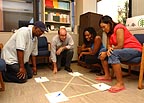August 11, 2006
Project will help minority students with math
CARBONDALE, Ill. -- A mathematician at Southern Illinois University Carbondale is furthering the cause of civil rights by helping high school and college students learn to work with younger minority students on their math skills.
Gregory Budzban, professor of mathematics in the College of Science at SIUC, recently received a grant from the Young People's Project Inc. to develop methods for training the high school and college-age students as "math literacy workers." The grant covers creating training methods, materials and workshops aimed at producing up to 500 such workers.
The Young People's Project grew out of the Algebra Project, the brainchild of civil rights-era activist Robert P. Moses, an innovative math educator who created the program to improve minority students' mathematical performance. Budzban met Moses in 2001 when he invited him to speak at SIUC. The two have continued to collaborate ever since.
Moses organized civil rights efforts in Mississippi during the 1960s. He studied at Harvard University and later taught high school in Jackson, Miss. He considered higher math as a "gatekeeper" issue that could open or close doors on a vast number of career fields. His views prompted him to create the Algebra Project, which focuses on the approach junior high school teachers take to math concepts to make them translate better to higher math.
Moses' daughter, Maisha Moses, who is finishing her master's degree in mathematics at SIUC this fall, was an early beneficiary of her father's effort. She saw first-hand growing up in Cambridge, Mass., the effect that poor math backgrounds had on other minority students.
"I was the only person of color in honors math and science classes in high school," she said. "My friends would say, ‘oh, you're so smart.' But I knew it wasn't that. My dad had made sure I was prepared with algebra. Later, I saw the difference that made for me and the choices it afforded me."
Maisha Moses came to SIUC in 2004 after earning her bachelor's degree in psychology at Harvard. She works with Budzban on several math literacy initiatives, including the grant from the Young People's Project, which Robert Moses' son and Maisha's brother, Omo Moses, started.
Previously, Budzban and Robert Moses teamed up on a $700,000 grant from the National Science Foundation titled "Raising the Floor," which focused on ninth-graders and incorporated Budzban's work on the so-called "Road Coloring Problem" into the Algebra Project's approach.
Their efforts used innovative games to demonstrate the principles of classic math problems, using peer instructors who are just a year or so older than the students.
"The approach we use is to immerse students in what we call mathematically rich experiences," Budzban said. "The Road Coloring Problem can be approached like a game. But it's a game that can operate on many different levels of math, some of them quite deep. Part of our work has been tailoring the approach to the problem to the age of the students."
This fall and winter, Budzban and Maisha Moses will work on tailoring another game — The Flagway Game — to the appropriate age level, as well as work on starting "math leagues" at several sites around the country.
"There is very deep math in each of these problems that can be made accessible to a full range of students," said Maisha Moses, whom Budzban said was instrumental in obtaining the grant. "The math league will be like Little League, except they'll be doing math instead of baseball."
A third grant proposed by Budzban at $3.3 million is pending with the National Science Foundation. If approved, it will pay for developing curriculum, pilot programs, community involvement and teacher training for expanding the program to a second year of algebra and a first year of geometry. The program would focus on school districts where minority students are not performing well in mathematics, Budzban said.
For Budzban, improving math performance among minority students is crucial in today's evolving global economy, which is largely based on technological and scientific skills.
"Students who come to the University without the proper math preparation, roughly half the programs are closed to them. Many of those areas are among the fastest-growing professions," Budzban said. "If they can't take college algebra and calculus, there are so many restrictions on their professional options. There are many of these kids who want to be in the engineering or scientific areas with no realistic chance of doing it."
Maisha Moses said giving young people options is the goal.
"I want everyone to have the chance at an education that provides a full range of choices," she said.
Offering education and training activities for a variety of pre-adult age groups is among the goals of Southern at 150: Building Excellence Through Commitment, the blueprint the University is following as it approaches its 150th anniversary in 2019.

Teaching the teachers – Melvin
Weaver and Demetrica Gorden,
far left and right, respectively,
both teachers at Lanier High
School in Jackson, Miss., work
with Greg Budzban, associate
professor of mathematics at
Southern Illinois University
Carbondale, and Maisha Moses,
SIUC graduate student in
mathematics, center, last week
at SIUC. The group worked on
The Road Coloring Problem,
which is used to instruct ninth
-graders in higher math concepts.
Download Photo Here
